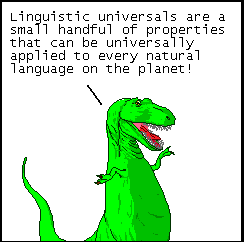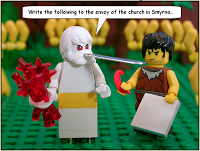If you’re at UWA tomorrow for Orientation Day (that’s Friday, 19 Feb), why not stop by the UWA Atheist & Agnostic Society tent on the big lawn? I’ll be there signing up new members, debating any believers that feel like a challenge, and trying to drown out the horrible dance music pumped out by nearby groups at high volume the entire day. Should be a lot of fun!
Good Reason
It's okay to be wrong. It's not okay to stay wrong.
Category: fun (page 4 of 7)
In what is believed to be the quickest turnaround in humour history, jokes about the name of the Apple iPad became ‘no longer funny’ minutes after being conceived.
The previous record was held by the Liam Lynch song “My United States of Whatever”.
“We’ve never seen a joke age this quickly, ” says Frank Overton of the Comedy Institute, a humour think-tank. “It’s probably because of the juvenile nature of the joke, combined with the fact that, well, there’s only one joke you can make. iTampon. How many times can you say ‘iTampon’?”
The joke will be added to the list of no longer funny things, including jokes about the vibrate function on mobile phones, quoting Monty Python sketches in their entirety, and potentially risqué variations on the word “Pokémon”.
One of my research interests is getting Internet volunteers to contribute to linguistic resources. And here’s one such effort, courtesy of Massimo Poesio: it’s Phrase Detectives.
It’s sort of a fun game where you get points for figuring out how pronouns (and other things) refer back to other entities in a text. Of course, the benefit to linguists is that it all goes toward the creation of a 1.2-million-word anaphor resolution corpus. A very worthwhile project.
By now, everyone must have seen ‘No Country for Old Men’. I’ve only just watched it now — I don’t often have the chance to sit and watch a movie. It’s one of those that keeps coming back to you days later.
The key ingredient in the film is the antagonist Anton Chigurh, a remorseless killer with a Prince Valiant hairdo and an air tank. He’s as omniscient as the next psychotic villain, but he’s not invulnerable; Moss, his quarry, can injure him, and you wonder if that means Moss will be able to turn the tables. Even so, Chigurh has a formidable willingness to dispatch you for the sake of getting your car and continuing his pitiless and emotionless pursuit of Moss, as well as anyone else who crosses his path or even looks at him.
One of the most memorable scenes is the ‘coin toss’, which appears early in the film. It’s a model of how to write film dialogue. At the counter of a gas station, the Proprietor bumbles onto Chigurh’s bad side with a casual question about where he’s come from, and Chigurh won’t let it go. He draws the Proprietor deeper into the conversation and thus deeper into trouble.
Watch:
Unlike the dialogues I study, it’s a fictional conversation, but it lends itself really well to analysis. Two items in my bag of tricks are Conversational Analysis (CA) as elucidated by Sacks, Schegloff, and Jefferson, and game theory, especially Bill Mann’s Dialogue Macrogame Theory (or DMT). CA is concerned with the mechanics of dialogue, particularly the back-and-forth of its parts. Game theory, as I’m using it here, refers to the way people make ‘bids’ to take the dialogue in this or that direction.
From the top:
CHIGURH
How much?PROPRIETOR
Sixty-nine cent.CHIGURH
And the gas.
So far, all standard. Chigurh initiates the dialogue with a question, the proprietor answers. This is known as an adjacency pair. We use adjacency pairs habitually; questions lead naturally to answers, comments lead to acknowledgements. It’s the unconscious nature of adjacency pairs that will draw the Proprietor into this tense and dangerous exchange.
PROPRIETOR
Y’all getting any rain up your way?CHIGURH
What way would that be?
The Proprietor innocently starts a question-answer adjacency pair. But it’s not a question Chighur likes, so he doesn’t answer it. Instead, he takes control by asking a clarification question of his own.
PROPRIETOR
I seen you was from Dallas.CHIGURH
What business is it of yours where I’m from, friendo?
Uh-oh. Someone has noticed Chigurh’s point of origin, and could rat him out. The Proprietor’s original question is still hanging, unresolved.
PROPRIETOR
I didn’t mean nothin’ by it.CHIGURH
Didn’t mean nothin.
The Proprietor attempts to repair this situation, but Chigurh won’t have it.
PROPRIETOR
I was just passin’ the time.
If you don’t wanna accept that I don’t know what else I can do for you.
The Proprietor is trying to preclude any further repair attempts. Then:
PROPRIETOR
…Will there be somethin’ else?CHIGURH
I don’t know. Will there?
People don’t like to close a dialogue down too abruptly, so most dialogues have a ‘pre-closing’ stage, just to make sure nobody has anything else to say. Here, the Proprietor makes a bid to ‘pre-close’ (wouldn’t you?), but instead of meeting the bid with a yes-no answer, Chigurh thwarts the bid with another question. Which the Proprietor needs to address.
PROPRIETOR
Is somethin’ wrong?CHIGURH
With what?
You give a question, you expect an answer, but Chigurh isn’t cooperating.
PROPRIETOR
With anything?CHIGURH
Is that what you’re asking me? Is there something wrong with anything?
Chiguhr does it again — he’s not letting the Proprietor take the ‘initiative’ — the first step — anywhere, he’s not resolving any of these adjacency pairs, and he’s using another question to push the dialogue down one more layer. We’re three levels down in this dialogue, which is about as much as people are good at handling. Any deeper and the Proprietor will be lost. So it’s another attempt at pre-closing:
PROPRIETOR
Will there be anything else?CHIGURH
You already asked me that.
Chigurh gives not another question, but a hostile meta-comment on the dialogue. The Proprietor only has one way out: make a bid to terminate the dialogue proper.
PROPRIETOR
Well…I need to see about closin.CHIGURH
See about closing.PROPRIETOR
Yessir.
Bid rejected, using an acknowledgement. Now Chigurh takes control, issuing question after obliquely threatening question.
CHIGURH
What time do you close?PROPRIETOR
Now. We close now.
A question-answer pair, but Chigurh’s not happy with it. He will decide the level of specificity required.
CHIGURH
Now is not a time. What time do you close.PROPRIETOR
Generally around dark. At dark.
At last, something resembling a completed adjacency pair. But Chigurh isn’t content to let it rest:
CHIGURH
You don’t know what you’re talking about, do you?PROPRIETOR
Sir?CHIGURH
I said you don’t know what you’re talking about.
The Proprietor no longer knows how to play this. He lets Chigurh take all the initiative.
CHIGURH
What time do you go to bed?PROPRIETOR
Sir?CHIGURH
You’re a bit deaf, aren’t you? I said what time do you go to bed.PROPRIETOR
Well…Somewhere around nine-thirty. I’d say around nine-thirty.CHIGURH
I could come back then.
You don’t want this guy to come back when you’re in bed.
PROPRIETOR
Why would you be comin’ back? We’ll be closed.CHIGURH
You said that.
It’s the first time in a while that the Proprietor has taken the initiative in this dialogue, but Chigurh shuts him down with another meta-comment about the dialogue itself. Now the Proprietor makes another bid to terminate the dialogue, but Chigurh quashes it with another question.
PROPRIETOR
Well…I got to close now–CHIGURH
You live in that house out back?PROPRIETOR
Yes I do.
He knows where you live.
CHIGURH
You’ve lived here all your life?PROPRIETOR
This was my wife’s father’s place. Originally.CHIGURH
You married into it.
Chigurh does not attempt to conceal his disdain. The Proprietor must realise he’s in danger, but can’t stop babbling. He’s in this conversation now.
PROPRIETOR
We lived in Temple Texas for many years. Raised a family there. In Temple. We come out here about four years ago.CHIGURH
You married into it.
Chighur now owns this conversation, and isn’t going to make any concessions.
PROPRIETOR
…If that’s the way you wanna put it.CHIGURH
I don’t have some way to put it. That’s the way it is.CHIGURH
…What’s the most you’ve ever lost on a coin toss?
And this takes us to Chigurh’s game, which establishes another part of his character — he’s murderous, but also capricious and arbitrary. The coin toss is probably more interesting for philosophical reasons than for its dialogue, so I’ll stop the analysis there.
It is interesting, however, to note the way Chigurh and the Proprietor discuss the stakes of the game. The Proprietor is no doubt aware of the danger he’s in, but is carefully trying to determine the nature of the danger. They both avoid talking about the stakes of the game directly — the Proprietor, because if he says it, it might happen; Chigurh, because he considers himself an agent of Fate. Discussing it directly would make him responsible, and he’s not; the evil swirling through the film is bigger than this one man.
It’s a rather long scene. One screen-writer says he might have suggested trimming the first part. But you can’t. You can’t just start The Game. First, you have to draw your victim in. Chigurh does this by manipulating the conversation — grabbing the initiative, refusing to resolve any of the Proprietor’s adjacency pairs, and pushing the dialogue down level by level until the situation is inextricable.
I got the chance to see Tim Minchin’s show ‘Ready for This’ last week. Highly recommended, if you ever get the chance to see him. I’ve always enjoyed his musical comedy with a skeptical bent. What I hadn’t expected was how accomplished a pianist he is. He was really ripping up and down the keyboard.
And as a special treat, the encore was his lovely Christmas song, “White Wine in the Sun”. Have a listen.
I like to imagine the family gathering he’s describing — not a bad description of Christmas in Perth, I must say.
When people talk about the ‘true meaning of Christmas’, they usually mean a certain dead Palestinian. That’s not the case for me anymore. Now Christmas is about music (I do a lot of singing), but also being with the people you love, and who make you feel safe.
A lovely song. Follow this link to buy it from iTunes — part proceeds to autism research.
Did you know that Zippy the Pinhead has his own theme song? I’ve just run across it.
It’s a strange little item. The music was written (partially) by Janis Siegel of the Manhattan Transfer, and the lyrics were written by Fred Schneider of the B-52’s. So if those two artists are on your radar, this is rather a unique collaboration.
The song reminds me of Zippy, in a way. The chord progressions are weird and hard to follow, just like the strip. The lyrics are full of pop culture references, just like the strip. And something about it suggests that it could have been more interesting… just like the strip.
If Zippy isn’t your cup of Fresca, maybe you’ll have better luck with the latest version of Autotune the News. I’m on tenterhooks, waiting for #8 to drop.
T-Rex from Dinosaur Comics shares with us some linguistic universals.

Of course, he’s talking about absolute universals (like the fact that all human languages use nouns and verbs), but don’t forget that there are lots of implicational universals. If a language has a word for ‘blue’, it will also have a word for ‘red’, but not the reverse. Or if a language has a word for ‘toes’, it’ll have a word for ‘legs’, but not the reverse.
T-Rex would probably like to know that some languages have no word for ‘fingers’, since he’s a bit short in that department.
It’s almost time to get going on my Linguistics 102 class, ‘Language as Cognitive System’. It’s about brain, language, and perception. What better way to start than a fascinating optical illusion. Your eyes tell you that the big swirly lines are alternately blue and green. But your eyes are mistaken. They’re really the same colour. If you’re not convinced, pull down the file to your desktop and zoom in on it until the context is gone and the two colours merge into one.
Our visual system — indeed our human brains themselves — are pretty amazing devices that work pretty well most of the time. They work by showing us a view of reality not as it is, but close enough to be useful to us. Optical illusions exploit the bugs in our system.
This has a certain degree of relevance to me right now. I’m visiting with my family. They’re True Believers™, who rely on ‘spiritual experiences’ for evidence of their religious beliefs, which they are convinced cannot be wrong. This optical illusion is compelling evidence that our experiences, convincing though they seem, can be illusory.
Language changes, but these lexicographers aren’t exactly happy about it.
My one beef: Did she say that English was a beautiful language? English? I don’t know of any standard to measure ‘beauty’ among languages, but I admire English more for its tenacity and size of vocabulary than for any aesthetic properties I can think of. In private moments I wonder that it works at all.
via Language Log
Reverend Smith, creator of the Brick Testament, has finally gotten up to Revelation.
It’s surreal to see the beasts with the six wings and and eyes all over. Seeing them depicted makes me think, “I believed this?”

The greatest part for me was how Jesus was depicted. You will remember, of course, from your reading of Revelation that John says Jesus had eyes like fire, and a double-edged sword coming out of his mouth. Well, so it is here. Like, every time Jesus appears, there’s that sword!

Wonder if he has a hard time making himself understood. Perhaps he just has exceptionally clear diction.
© 2024 Good Reason
Theme by Anders Noren — Up ↑
Recent Comments